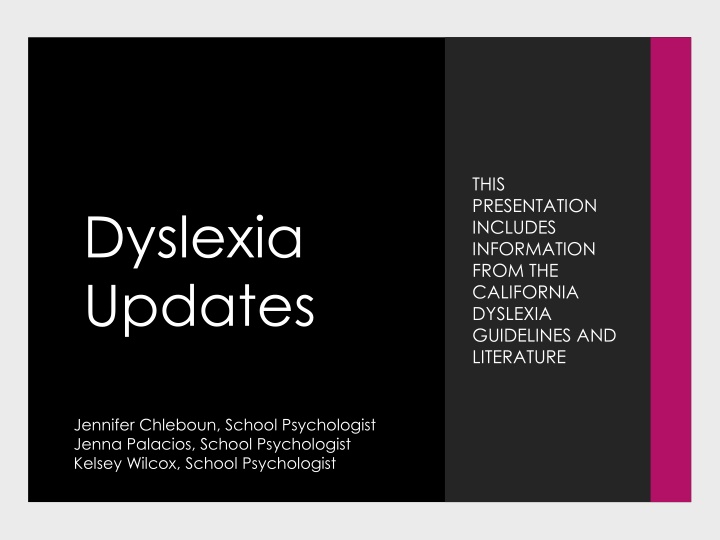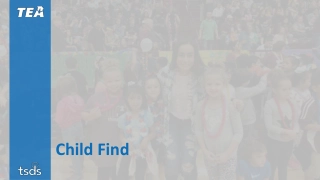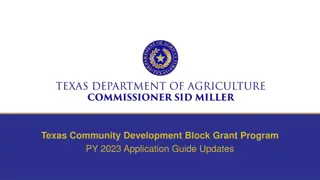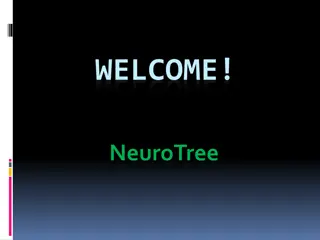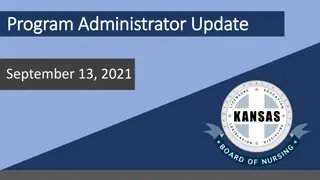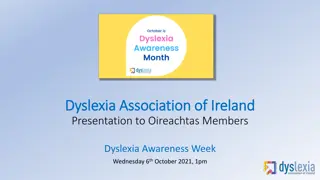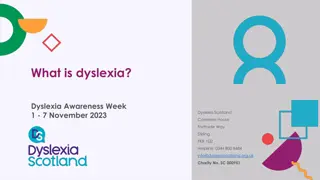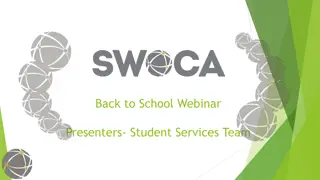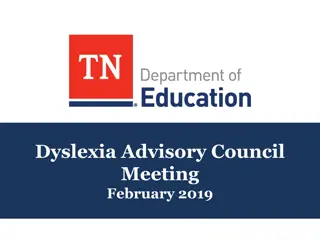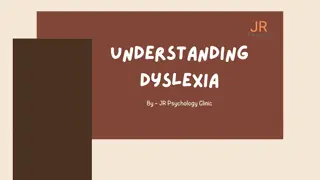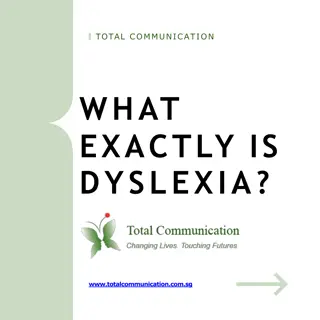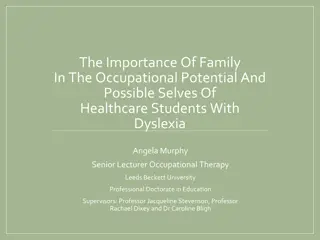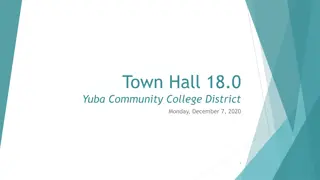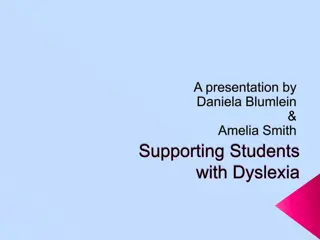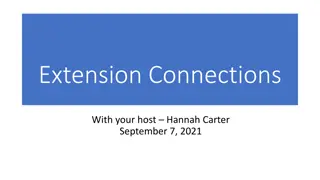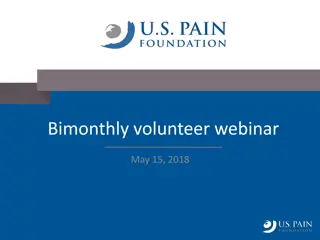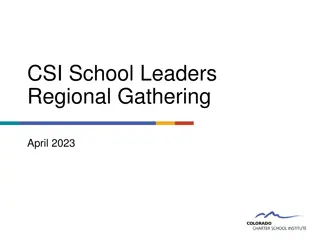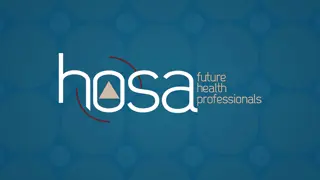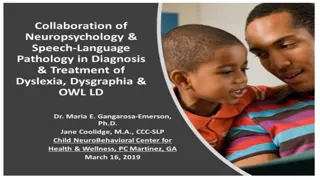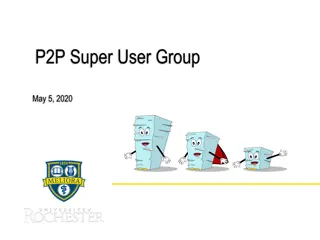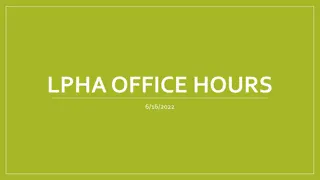Dyslexia Updates
This presentation includes information from the California Dyslexia Guidelines and literature, as well as debunking common myths about dyslexia. Explore misconceptions and facts surrounding dyslexia, including insights from school psychologists and the University of Michigan. Learn why dyslexia is not a medical diagnosis, the intelligence-dyslexia connection, the reading abilities of dyslexic individuals, and the harmful myths that perpetuate misconceptions about dyslexia. Empower yourself with knowledge to better understand and support individuals with dyslexia.
Download Presentation

Please find below an Image/Link to download the presentation.
The content on the website is provided AS IS for your information and personal use only. It may not be sold, licensed, or shared on other websites without obtaining consent from the author.If you encounter any issues during the download, it is possible that the publisher has removed the file from their server.
You are allowed to download the files provided on this website for personal or commercial use, subject to the condition that they are used lawfully. All files are the property of their respective owners.
The content on the website is provided AS IS for your information and personal use only. It may not be sold, licensed, or shared on other websites without obtaining consent from the author.
E N D
Presentation Transcript
THIS PRESENTATION INCLUDES INFORMATION FROM THE CALIFORNIA DYSLEXIA GUIDELINES AND LITERATURE Dyslexia Updates Jennifer Chleboun, School Psychologist Jenna Palacios, School Psychologist Kelsey Wilcox, School Psychologist
Myth Busters Zzi.sh Class code kjn4775 Information from the University of Michigan http://dyslexiahelp.umich.edu/dyslexics/learn-about- dyslexia/what-is-dyslexia/debunking-common-myths- about-dyslexia
Questions and Answers Dyslexia is a Medical Diagnosis (False) Dyslexia is not characterized as a medical problem and is not typically diagnosed by doctors because they don t have training in oral language, reading, writing, or spelling assessment and diagnosis. Smart People cannot be dyslexic or have a learning disability (False) Dyslexia and intelligence are NOT connected. Many dyslexic individuals are very bright and creative and have accomplished amazing things as adults. People with dyslexia cannot read (False) Incorrect. Most children and adults with dyslexia are able to read, even if it is at a basic level. Spelling is one of the classic red flags alerting parents and teachers of a serious underlying problem. The child may be unable to understand the basic code of the English language and cannot break down or reconstruct (with spelling) words using codes (letters).
Questions and Answers Continued Dyslexic children will never read well, so it's best to teach them to compensate (False) Individuals with dyslexia can become terrific readers with the appropriate intervention (i.e., systematic, explicit, and research- based). It is important to test a child early in his/her school career in order to identify any problems and attempt to prevent major reading difficulties before they even start. People with dyslexia see things backwards (False) Dyslexics do not see things backwards because dyslexia is not a problem with the eyes. While new research has demonstrated that letter reversals of kindergarten children predicted spelling at 2nd grade, typical learners can reverse letters when initially learning.
Questions and Answers Continued Children with dyslexia are just lazy, they should try harder (False) If there is ONE myth that we'd like to see disappear, it is this one. Lack of awareness about the disorder among educators and parents has ofter resulted in the child being branded as "lazy." What frequently happens is that these children learn that they are going to fail at tasks of reading, spelling, and writing; it becomes an attempt at self- preservation (i.e., rather than try and fail, it is safer to just not try or work laboriously to no avail). Retaining a child (i.e., holding them back a grade) will improve their academic struggles (False) According to several institutions (i.e., U.S. Department of Education, American Federation of Teachers, National Association of School Psychologists), there is no benefit to retention because it has never improved a student s academic struggles. These students do not need another year of the same instruction -- they need differentiated intervention that is research-based, systematic, and explicit.
Questions and Answers Continued Children without an IEP can get classroom accommodations (True) Children with 504 Plans can get the same classroom accommodations as children with IEPs. Also, teachers can give classroom accommodations to any student, regardless of whether that student has an IEP or a 504 Plan or not. Dyslexia can be cured or helped by special balancing exercises, fish- oils, glasses with tinted lenses, vision exercises, NLP magical spelling, modeling clay letters, inner-ear-improving medications, training primitive reflexes, eye occlusion (patching). etc. (False) None of these remedies have been found to be effective based on scientific evidence. Dyslexics require explicit and systematic instruction in phonological awareness, phonics, and spelling patterns and rules. Additionally, they may need strategies for vocabulary, reading comprehension and writing, as well as verbal expression and word retrieval.
Summary of Information Regarding Understanding Dyslexia Unexpected difficulty in reading (in an individual who has the intelligence to be a much better reader), due most commonly to phonological processing, which affects speaking, reading, spelling, and often second language acquisition Early diagnosis is especially critical for narrowing the achievement gap Dyslexia affects people from different cultural, ethnic, and socioeconomic backgrounds nearly equally Dyslexia is heritable, it is important to ask about family history Often occurs concurrently with other handicapping conditions (e.g., dysgraphia, dyscalculia, oral language impairment, ADHD).
Dysphonetic Dyslexia Characterized by the reader s inability to utilize a phonological route to successfully bridge letters and sounds Instead the reader tends to rely too much on orthographic cues to identify words in print They may: Frequently guess words based on the initial letter Approach reading by simply memorizing whole words They have difficulty incorporating strategies that would allow them to rapidly read words in a sound-based manner Early intervention should focus on emphasizing the development of phonemic awareness and phonological processing
Surface Dyslexia Students are readily able to sound out words but lack the ability to automatically and effortlessly recognize words in print They may: Be letter-by-letter/sound-by-sound readers Break words down into individual phonemes Read slowly and laboriously Fluency tends to suffer the most, and phonological processing remains relatively intact Transpose words or struggle to read phonologically irregular words Have difficulty determining if a string of letters is a word or nonword (affecting comprehension) Struggle to read out loud Specific interventions should focus on enhancing their automaticity, pacing, and fluency skills, without being rooted in an explicitly phonological approach
Mixed Dyslexia These readers have difficulties across the language spectrum and are characterized by a combination of poor phonological processing skills, slower rapid and automatic word recognition skills, inconsistent language comprehension skills, and bizarre error patterns in their reading Interventions should focus on a balanced literacy approach, which targets multiple aspects of the reading process
Reading Comprehension Deficits It is estimated that 10% of all school-aged children have good decoding skills but have specific difficulties with reading comprehension These readers struggle to derive meaning from print despite good reading mechanics To help determine the underlying cause of these difficulties, a comprehensive assessment should measure: Executive Functioning Strategies students use to self-organize incoming information with previously read material Working Memory Amount of memory needed to hold and manipulate information while engaged in a particular cognitive task Language Foundation The fund of words with which a student is familiar
English Language Learners It is difficult to distinguish between poor English reading skills that result from dyslexia and those resulting from reduced exposure to English Vocabulary knowledge and phonological awareness are associated with success in reading, young English learners who enter school with a limited vocabulary in English and limited or nonexistent literacy in their native language lack the prerequisite skills that facilitate reading development Because language background and exposure are environmental factors, the difficulties that these young English learners may demonstrate should not be confused with the reading difficulties of dyslexia. It is also important to remember that young English learners are often learning to read a language that they do not speak proficiently and, as result, have difficulty connecting the words they read with their meaning. When extrinsic factors are ruled out and when progress monitoring and observation indicate that it is necessary, formal evaluation using norm- referenced measures should follow informal information gathering.
Possible Accommodations Accommodations for homework assignments may include reducing homework, allowing students to dictate their answers, allowing typewritten work, and allowing extended time to complete assignments. Accommodations for mathematics may include the student s use of a calculator or graph paper and the teacher breaking assignments into smaller steps. Accommodations for reading may include providing the student with access to audiobooks and text-to-speech software; the teacher not calling on a student with dyslexia to participate in oral reading, unless the student volunteers; and allowing extra time to complete reading assignments
Possible Accommodations Continued Accommodations for writing may include providing a student with a scribe, providing access to speech- to-text software, and offering written or digital copies of notes; minimizing the need to copy from the board; and providing graphic organizers. Accommodations for spelling may include the teacher reducing the number of items on spelling lists, providing access to spell-check and word prediction software, and not deducting points for spelling errors. Accommodations for testing may include providing students with dyslexia with extra time, allowing students to give answers orally, and providing a quiet testing area.
Read Naturally (reading fluency) SIPPS (Phonics) Read 180 (Balanced approach) available at secondary Wonders Curriculum (has pieces in the extension that are beneficial for supporting reading fluency/phonological skill development) Evidence Based Programs Available in the District Work with instructional coach if you need access Lexia (individualized balanced approach on computer, should have a small group component) Consult with intervention teacher It is important to remember that one program may not work for all students, progress monitoring data should be used to determine if a student is making progress with the current approach, or if something else needs to be implemented
Additional Resources Florida Center for Reading Research, Student Center Activities, Grades K-5 https://fcrr.org/resources/resources_sca.html California Dyslexia Guidelines, Particularly Chapters 11 (page 63)and 14 (page 95) https://www.cde.ca.gov/sp/se/ac/documents/cadysle xiaguidelines.pdf International Dyslexia Association https://dyslexiaida.org/
Questions? Experiences with students with Dyslexia Other topics
Contact Information Contact your school psychologist Kelsey Wilcox, School Psychologist kelsey_wilcox@chino.k12.ca.us Jennifer Chleboun, School Psychologist jennifer_chleboun@chino.k12.ca.us Jenna Palacios, School Psychologist jenna_palacios@chino.k12.ca.us
